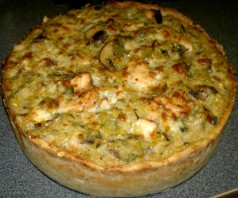The Miele showroom in Cavendish Place, near Oxford Street, was the less than homely location for this evening’s pastry master class. All, red, silver and gleaming with large, spotless ovens this was nevertheless a bright wide space – 2,500 sq ft! – simply crying out to be sullied by flour, butter and sugar.
Just as well then that our tutor was French baker and keen Anglophile, Richard Bertinet, BBC Food Champion of the Year 2010. He immediately set about demonstrating his no-nonsense technique by bashing a cold packet of butter to a flattened pulp with a rolling pin. I soon discovered that a lot of Richard’s preparation of pastry involves a less-than-Gallic brute force. Filling a mini tart case was executed by placing the pastry on top then dropping the whole thing from a considerable height to eradicate any air-pockets. For a man who’s supposed to love the craft he’s not shy of abusing his ingredients.
Of course this all serves a practical purpose and is part of Richard’s campaign to demystify baking, which started with his bestselling book Dough and continues with the latest Pastry. This introduces readers to four pastry recipes: ‘sweet’, ‘salted’ (both an approximation of shortcrust), choux and the dreaded puff, which he urges us to try making from scratch, at least once. Based on these principles, pastry courses are now taught from his permanent set up, The Bertinet Kitchen Cookery School in Bath, and this is what we were getting a flavour of today.
As Richard began the demonstration, focusing on ‘salted’ and ‘sweet’, he was asked about the floury well that is filled with egg – the prevalent technique for preparing pastry – which he casually dismissed as ‘TV chef’ show-boating. In fact, aside from insisting on weighing every ingredient to an exacting degree – as this significantly diminishes the margin for error – Richard’s refreshingly nonchalant attitude continued to dictate the dynamic of the evening. A leek, potato and Reblochon tart was cobbled together purely by hand and slapped into the oven with no cases or tins. Despite the no frills assemblage, it was big on flavour and texture; the pastry pleasingly soft and crumbly, the sharp leeks complementing the rich cheese and salty lardons.
There were plenty of handy tips dispensed during the next couple of hours. The quarter-turn when rolling your dough is to ensure the flattened result is even as you will inevitably press down harder with your leading hand and a square block of dough is easier to roll evenly as opposed to the more common ball, which often ends up as a lumpy mess. Also, it is better to under-work than overwork pastry as the result will always be a delectably soft, crumbly crust, which is never unpleasant. The formula of 1 egg per 100g of cream/crème fraiche is a beautifully simplistic rule of thumb and a godsend to anyone who likens baking to an arduous scientific experiment.
The making of the ‘sweet’ dough was next up and, again, demonstrated from scratch,the pastry then utilised in a range of mini fruit tarts. Frangipane and custardy fillings were topped with Bacchanalian displays of fresh fruit, including delicious white strawberries and frilly fans of peach, giving it all a reassuring illusion of healthiness amidst the decadence.
The key skill demonstrated here was getting the pastry cases right, which could then be kept in the fridge for a few days to be used for that dinner party flourish or simply to silence the kids. We were shown how to remove the remaining pockets of air using fingertips to pinch the pastry, swiftly and from the outside edge, into the groves of the mould. All this avoids the frustrating shrinkage that often occurs when pastry is introduced to heat and, sure enough, when the pastry cases emerged they were brown, edible facsimiles of the tart moulds.
Notably, when a fellow guest attempted this the results were passable but not altogether successful, due mainly to lack of conviction. This was pointed out by Richard whose philosophy is that pastry is all about confidence and being bold in your approach.
By the end, those who were bold enough, were given the opportunity to make some pastry, either sweet or salt, to take home. This was the true test of everything learned and a chance to see if we could display the confidence that our tutor had been keen to instil.
We each had a go, for fear of being singled out as wimps, and ended up with a neat little brown package of dough to take home and turn into something wonderful. I had made salt pastry and subsequently used the lot for a chicken, leek and tarragon pie, which I served to family and friends. While I’d like to claim that my filling did justice to the delicate, crumbly pastry, compliments were generally directed toward the latter component but this was fine as I had made the pastry myself, from scratch, which was near perfect after just a couple of hours tuition.
Pastry masterclasses at Richard’s own cookery school are completely hands-on, include lunch with wine and run regularly at a cost of £195 per person. So if, like me, you have a slight phobia of all things kneaded, rolled and baked, you now know who you can turn to for help.

